
AI-Powered Integration Platform
Automatically turn any data into ready-to-use data products. Integrate anything for AI, analytics, and operations. Do it all 10x faster, without coding, powered by AI.
Automatically turn any data into ready-to-use data products. Integrate anything for AI, analytics, and operations. Do it all 10x faster, without coding, powered by AI.
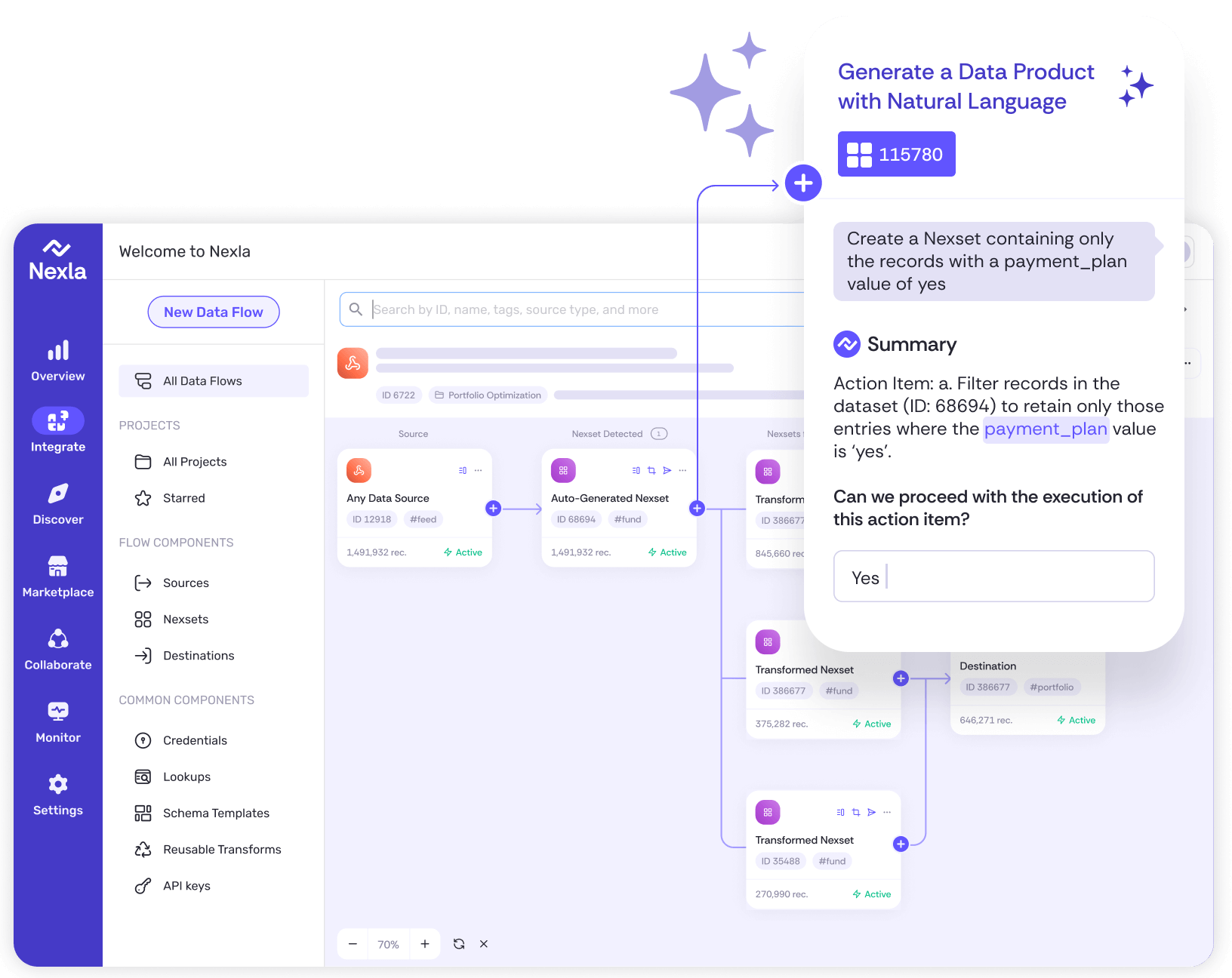
Just connect to any structured or unstructured data using 500+ universal bi-directional connectors, or any REST or SOAP API. Nexla automatically creates Nexsets, virtual data products that make any data ready to use and reuse.
Integrate any sources and destinations as data products with a single platform that combines data integration, iPaaS, GenAI RAG, and intercompany B2B integration. Reuse data products across projects to support AI, analytics, B2B, and operations initiatives.
Build any end-to-end integrations 10x faster without coding, using any combination of point-and-click operations and AI prompts, or extend using powerful APIs and your own code. Nexla does most of the work for you, powered by AI.
Nexla uses AI to automate most of the integration work. You do the rest in Nexla’s point-and-click UI, code, or using Nexla’s agentic interface within the Nexla UI.
You can use natural language (e.g. English) prompts to create data products and transforms to help you build flows faster.
The result is 10x greater productivity compared to the alternatives.
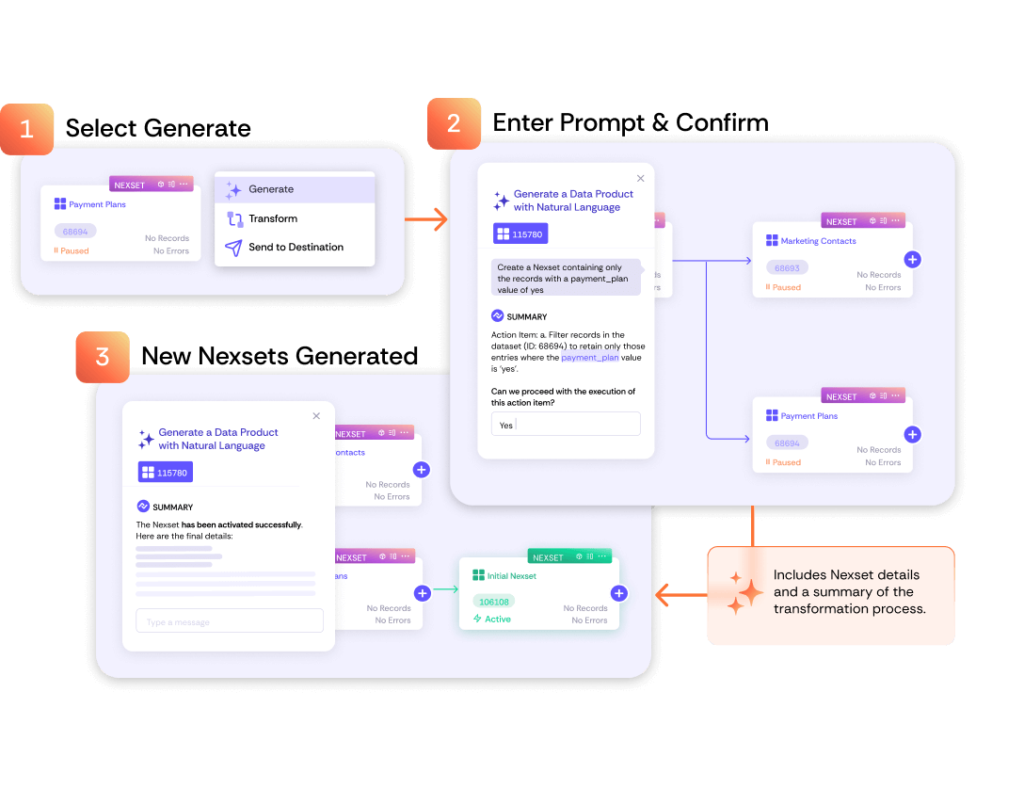
Choose from over 500 universal bidirectional connectors for cloud and on-premises apps, APIs, databases, data warehouses, files, file-based storage systems, e-mails, and just about any other data source. Setting up a connector takes seconds. Simply search for the source, select, and enter any required fields. Nexla uses AI to connect, extract metadata and configure the connector.
Nexla’s adaptive integration engine means you don’t have to wait for a new connector for each new source. Connect to any API and create your own in minutes.
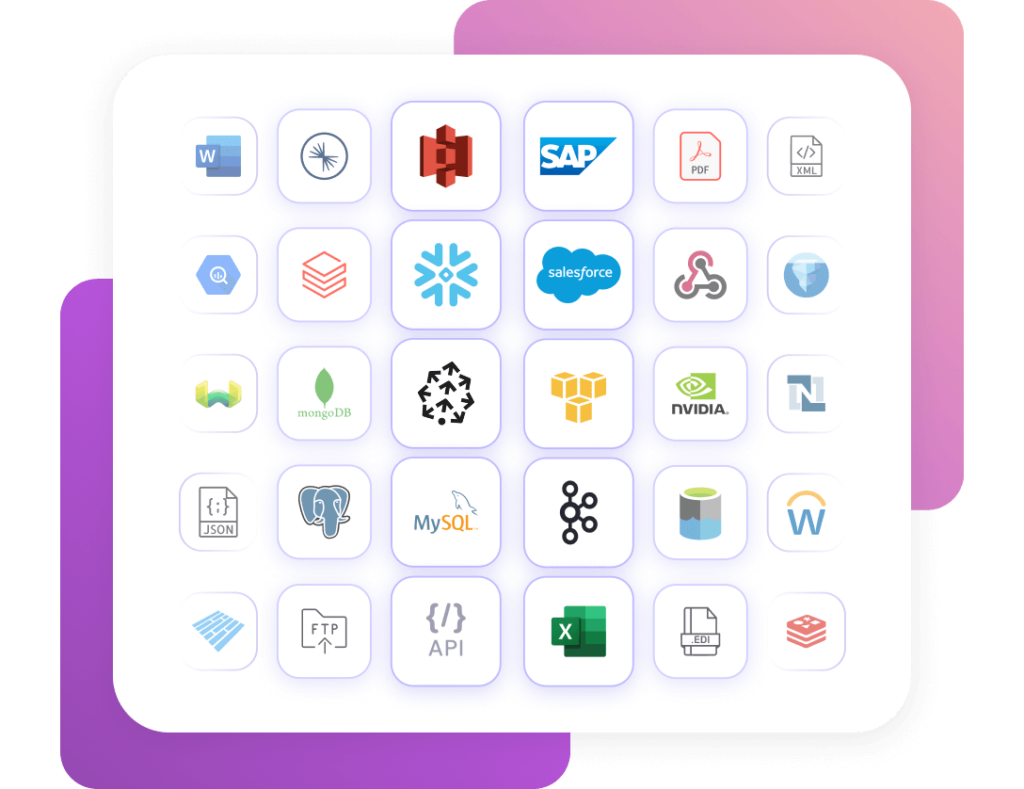
Once connected, Nexla automatically scans each source for the raw data and metadata, and uses metadata intelligence to prepare and transform any structured or unstructured data in any system into Nexsets, human-readable virtual data products,
Nexsets make it easy for anyone to access and consume data. They provide a unified, ready-to-use data model that is validated, documented, discoverable, governed with access and usage controls, and independent of formats, protocols, and data speeds.
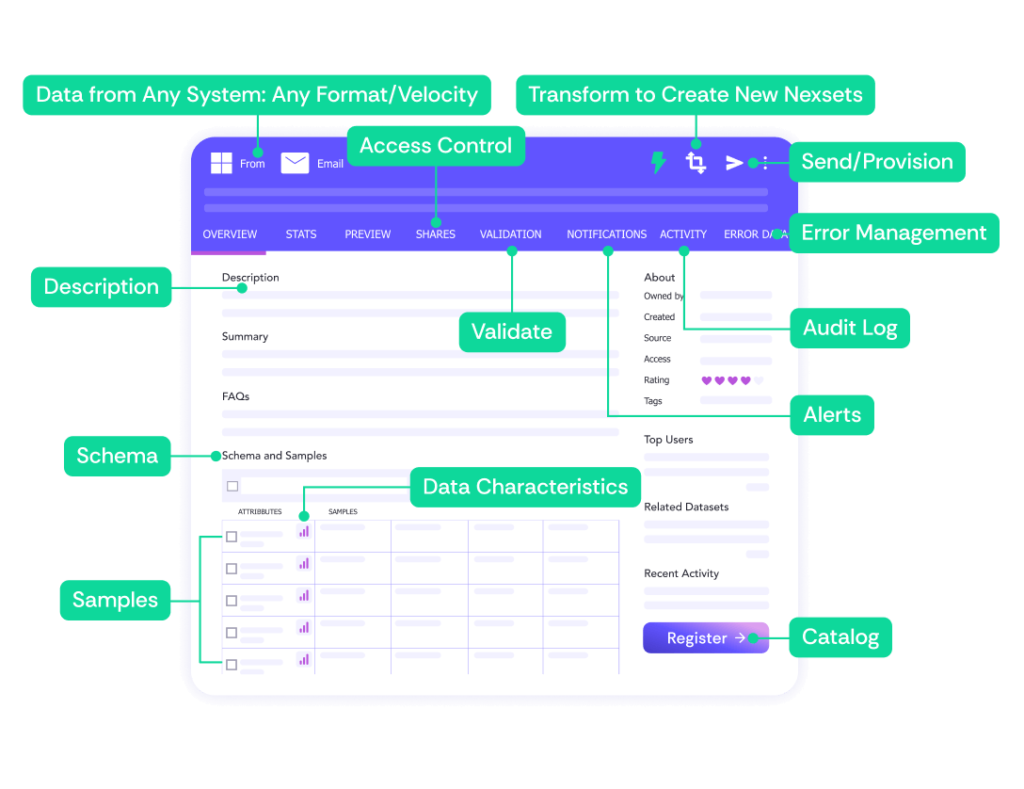
Centrally share and govern the full variety of data as managed data products. Data producers can publish any Nexset to the built-in private marketplace with a few clicks, sharing it with individuals or teams. Consumers easily discover, learn more about, and request access to Nexsets based on their privileges via a simple shopping-like interface. Administrators tailor each private marketplace based on each organization’s needs, manage domains, approve publication, and govern all access and usage based on policies.
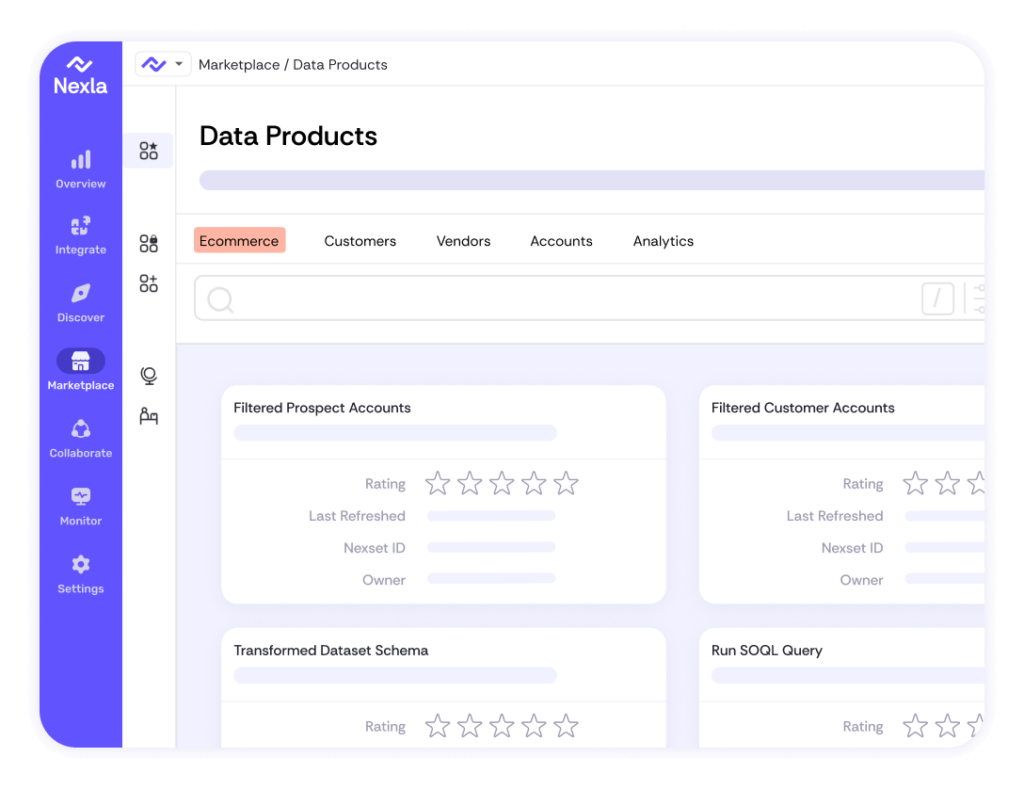
Nexla is the only converged integration platform that supports all styles of integration – ELT/ETL, change data capture (CDC), replication, R-ETL, API integration, streaming, (S)FTP, GenAI RAG, bring your own (BYO) integration, and more – in real-time or batch.
Just select the style you want to use from pre-configured integration templates. Then create flows and transforms without coding in minutes.
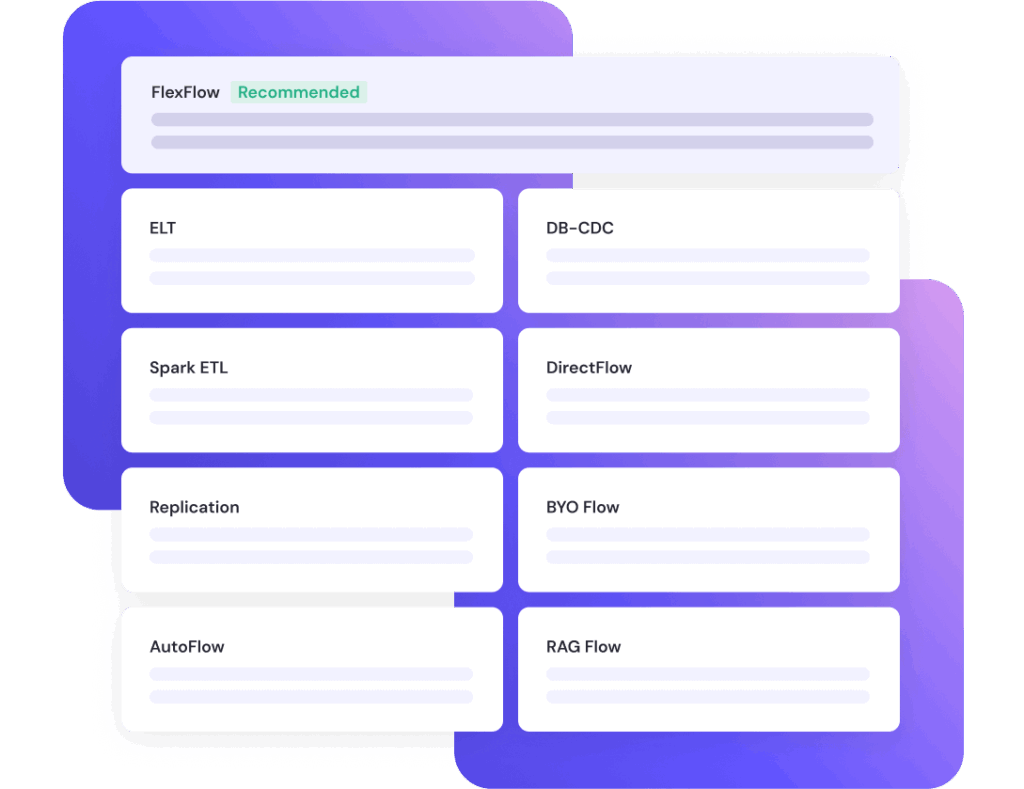
Nexla isn’t just powered by AI. It’s also for AI. Its agentic AI framework and designer also lets you use any data and create agents and assistants for any project to improve and automate your business.
Nexla’s agentic RAG lets you choose the best LLMS, vector databases, and other AI technologies to achieve the best results across GenAI projects. Connect to any structured and unstructured data, and chat directly with your data as you build. Continuously update a vector database. Configure RAG flows on a common modular RAG architecture that uses different modules and operators for each project to improve LLM accuracy and lower costs.
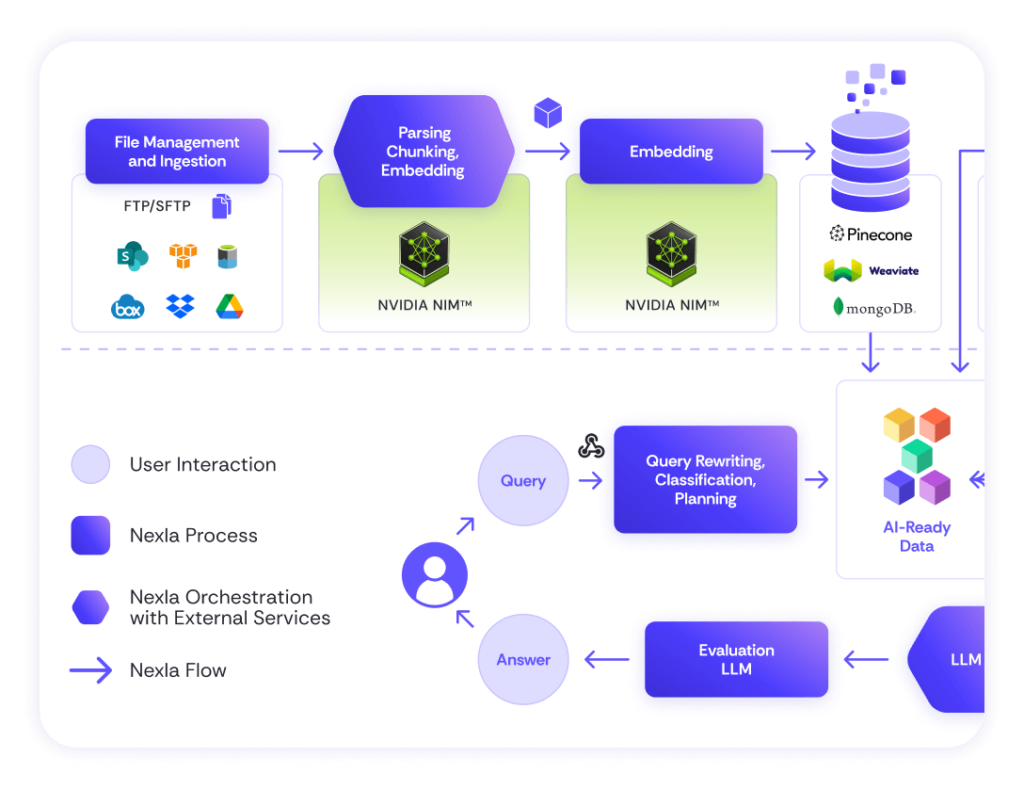
Using Nexsets, you can combine, prepare, filter, enrich, and validate your data without coding, using a rich library of pre-built transforms. You can also create your own reusable transformation rules in the Nexla Designer, and add your own SQL, Python, Javascript, and/or JSON code.
The Nexla Designer also recommends rules at each step based on what data you select and shows you results and errors as you work. Once done, this prepared, ready-to-use data can then be easily delivered to your destination without ever needing to code at all.
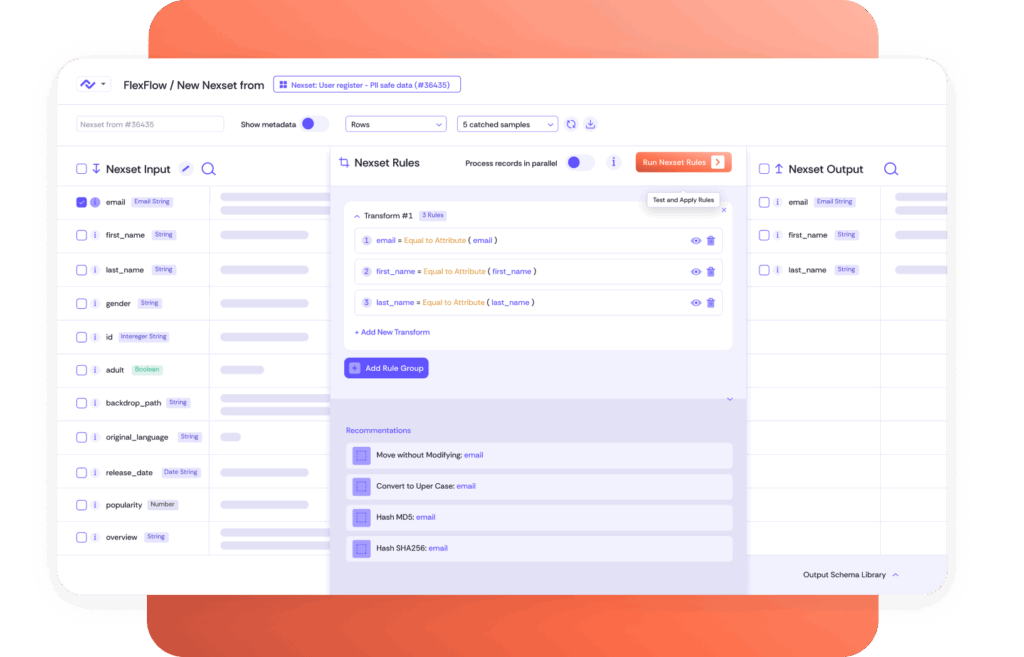
Nexla includes built-in data quality to make data ready-to-use. As a core part of creating data products, smart data validation generates data schema and quality rules, and allows you to add your own. As data errors are detected, they are quarantined to prevent downtime, and alerts are sent. You can automate responses to help address issues without manual intervention.
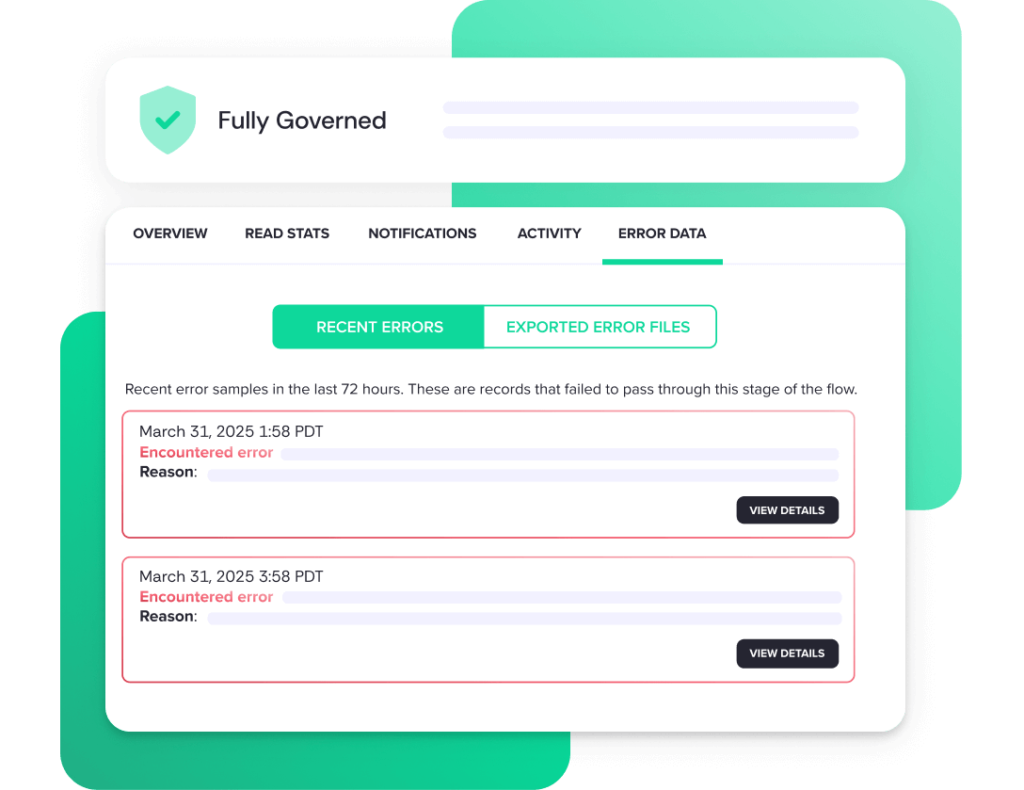
Nexla is designed to help companies govern all data usage. All data is accessed and managed as data products. During development, any request to share a data product goes through built-in approval processes within Nexla’s marketplace. You can control overall data access and usage through centralized policies. Nexla detects and tags PII, and provides built-in data masking and hashing as rules. Built-in end-to-end lineage provides audit trails and helps with troubleshooting.
Nexla also supports enterprise-grade governance and works with existing tools. This includes integration with governance tools like Collibra and Alation, workflow and approval tools like ServiceNow, and 3rd party IAM, authorization, and policy systems.
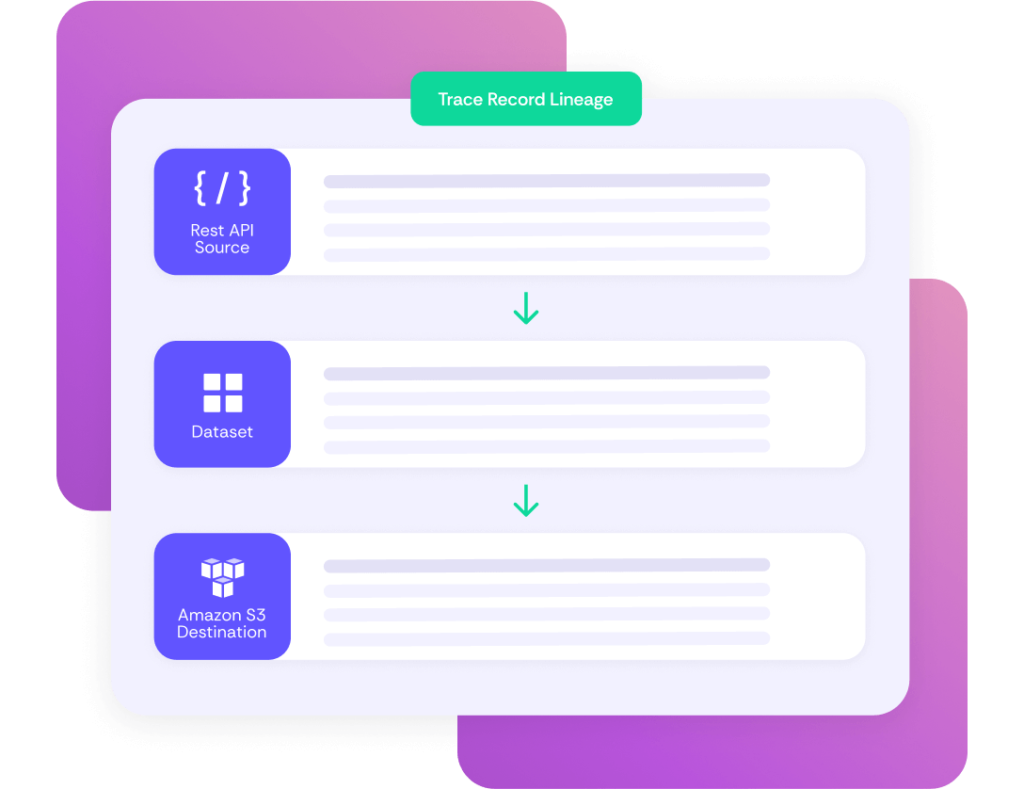
Nexla is secure by design. Nexla doesn’t store data. All data products are virtual. But it does enforce data encryption in motion and at rest, data privacy policies to obfuscate data, and advanced secrets management. It supports 3rd party Identity and Access Management (IAM) integration. Nexla also lets you deploy anywhere. It offers private deployment as an option, and local data processing by region.
Nexla complies with several standards, including SOC 2 Type II, GDPR, CCPA, and HIPAA.
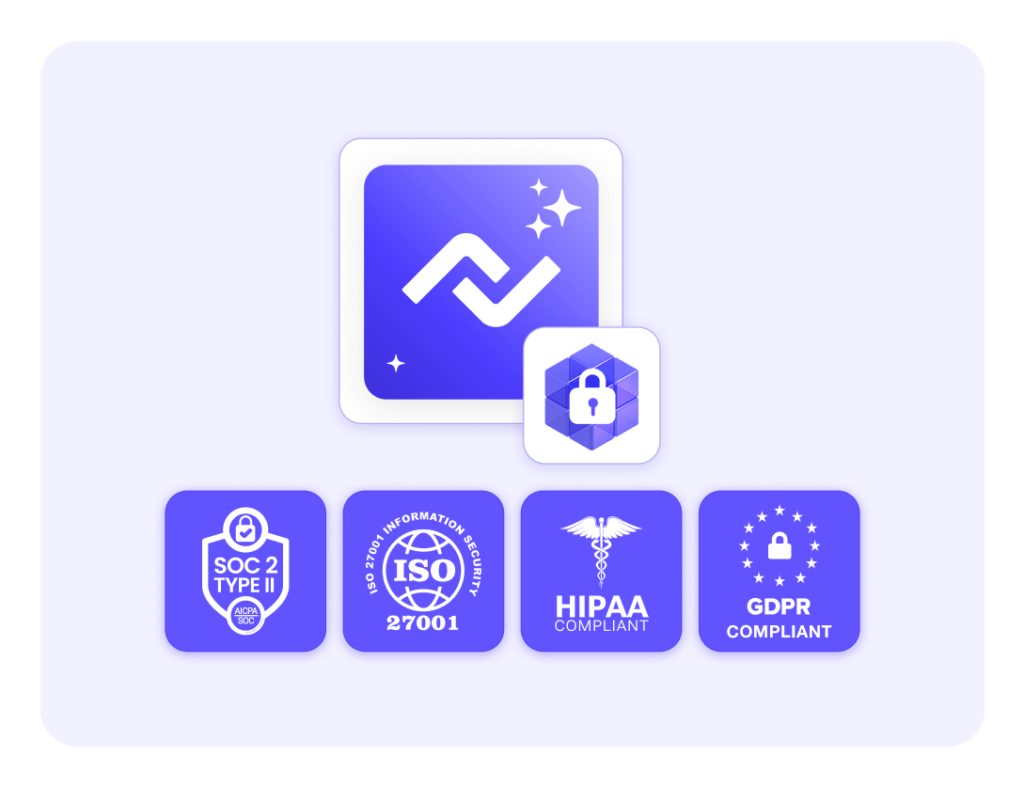
Nexla also provides extensive support for modern DataOps and schema evolution. Pipelines are auto-generated, updated, and auto-scaled – including Nexsets, transforms, and flows. Continuous metadata intelligence detects schema changes as they occur, and determines how to propagate changes from sources to destinations based on rules, such as adding attributes or creating a new version.
All configurations, schemas, transforms are automatically versioned and changes tracked. It is easy to know what changed, who changed it, and make corrections when needed.
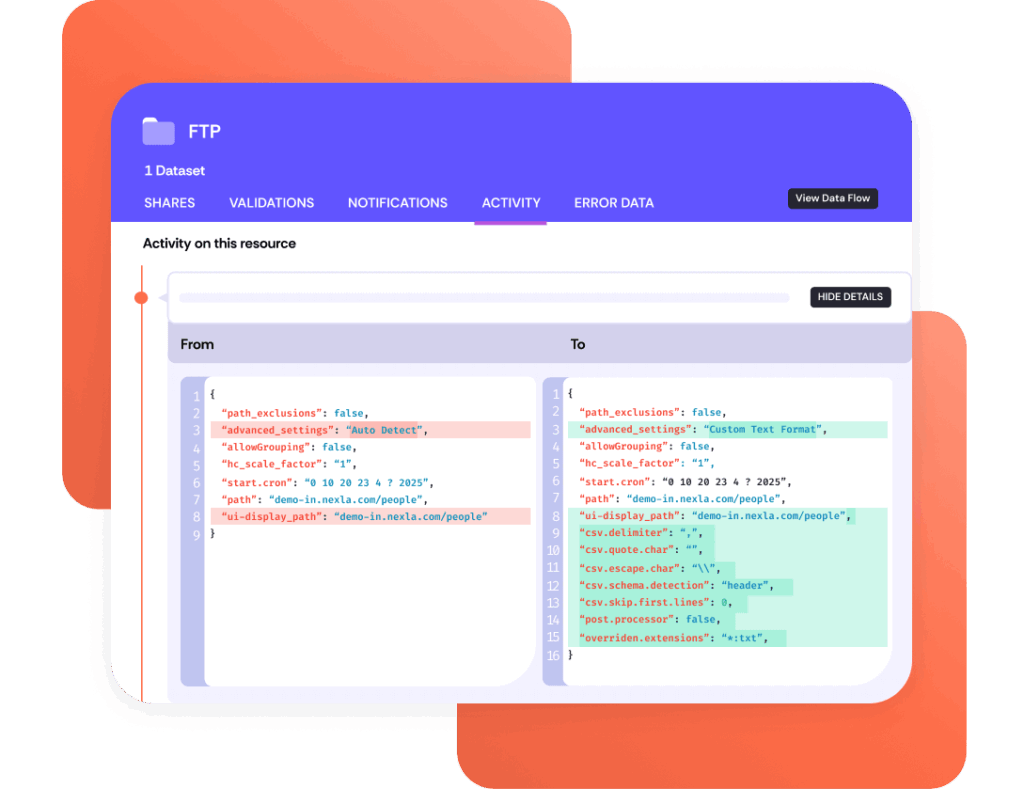
Monitor your data pipelines continuously and provide consistent, high-quality data for your business. Nexla learns your data characteristics and automatically applies smart validations.
When there are errors in the process, quantity, or quality of data, you get automated alerts and error handling. Nexla’s automatic tracking system gives you full control over how to handle each error. Easily trace back errors and fix them without disrupting your operations.
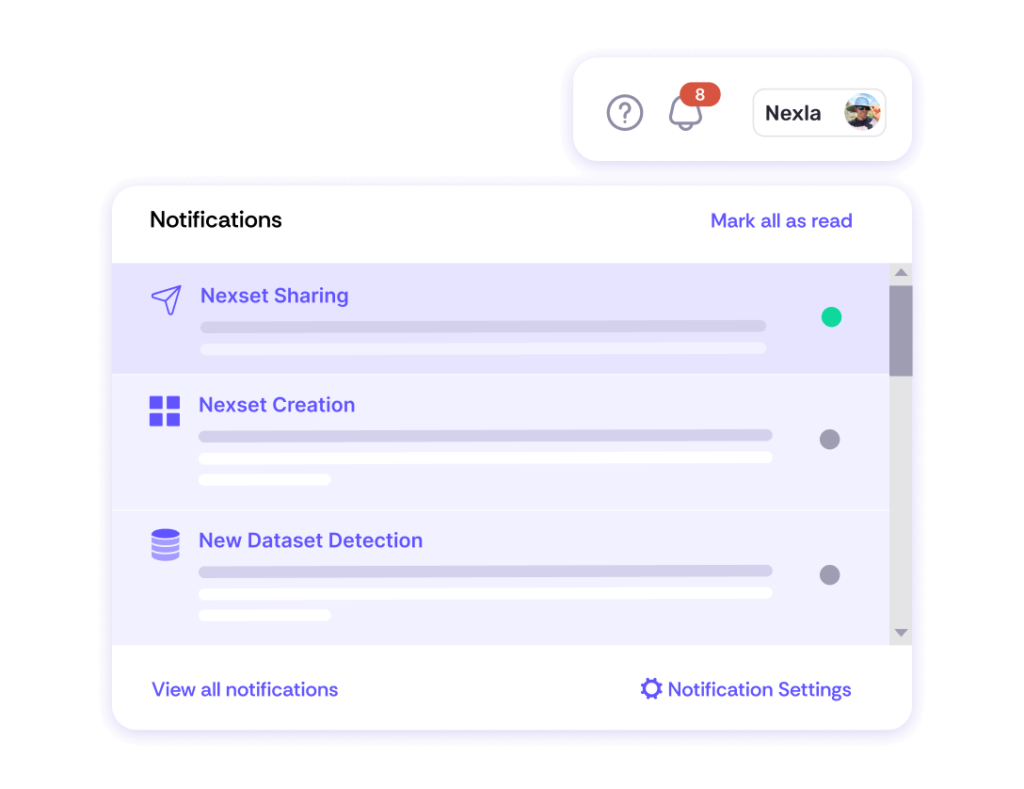
Nexla can be deployed as SaaS, Hybrid multi-cloud, and on premises in a data center or VPC with full support for AWS, GCP, and Azure. It has a separate control plane that can manage multiple distributed data planes. Enterprise features like single sign-on, automated versioning, complete audit trails, and record-level data lineage give you the operational control and visibility you need to run your critical data operations.







